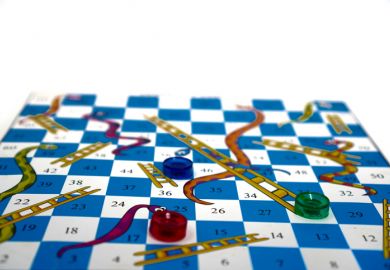Source: Alamy
Wake-up call: when it comes to lectures, appearances can be deceiving
Imagine you receive the same lecture twice: once from a charismatic lecturer speaking fluently without notes and maintaining eye contact; and again from a hesitant speaker, slumped over her notes and stumbling over her words. Which is better?
In terms of what you learn there is surprisingly little to choose between the two, according to a team of US psychologists.
The researchers asked two groups of students to sit through the same lecture delivered in radically different styles. When asked afterwards how much they felt they had learned, those who had experienced the more accomplished performance believed they had learned more than the second group. However, when tested, there was little difference found between them, with those attending the “better” lecture barely outperforming their poorly taught peers.
“The fluent instructor was rated significantly higher than the disfluent instructor on traditional instructor evaluation questions, such as preparedness and effectiveness,” say the researchers in the journal Psychonomic Bulletin and Review.
“However…lecture fluency did not significantly affect the amount of information learned.”
Students’ perceptions appear to be based “on lecture fluency and not on actual learning”, concludes the paper, titled “Appearances can be deceiving: instructor fluency increases perceptions of learning without increasing actual learning”. As a result, those who received the impressive lecture were disappointed with their test scores, whereas the attainment of those in the other group was more in line with their expectations.
One expert unsurprised by the result is Eric Mazur, Balkanski professor of physics and applied physics at Harvard University, who is an advocate of teaching through “peer instruction”, which involves lecturers regularly questioning students.
“With a better presenter it might seem like you are taking more in, but it doesn’t mean that anything has actually been learned - it doesn’t mean there has been an ‘Aha!’ moment,” Professor Mazur said.
“The hard work has to be done by the learner - there’s not much the instructor can do to make the neuro-connections necessary for learning.”
Professor Mazur, who is due to speak at the Turning Technologies User Conference in Karlsruhe, Germany on 3 June, said that despite modern technological advances, universities had work to do to redesign their lecture halls and rethink their teaching methods.
“What is really worrying is that people are jumping on the massive open online course bandwagon, taking a failed model and putting it online. We need to rethink how people approach teaching,” he said.
Register to continue
Why register?
- Registration is free and only takes a moment
- Once registered, you can read 3 articles a month
- Sign up for our newsletter
Subscribe
Or subscribe for unlimited access to:
- Unlimited access to news, views, insights & reviews
- Digital editions
- Digital access to THE’s university and college rankings analysis
Already registered or a current subscriber? Login




